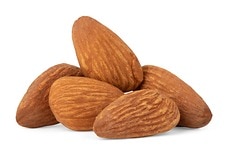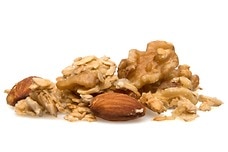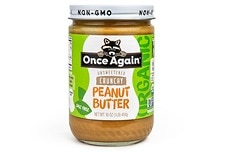Vitamin B7 (Biotin)
Vitamin B7, also called biotin or vitamin H, is a member of the B-complex vitamin family. Just like the other B vitamins, biotin is water-soluble so it dissolves easily upon entering the body. This means that it’s important to incorporate biotin into your diet on a daily basis. All B vitamins are considered essential because they are in charge of converting food (carbohydrates) into fuel (glucose) for energy that the body can use.
How do I get biotin?
Biotin is available in a wide range of foods, although it’s generally found in lower quantities than other water-soluble vitamins. The best sources of biotin are yeast, liver, kidney and egg yolks. Nuts such as peanuts and almonds, as well as nut butters, are also a good source of this vitamin. It can be found in other foods like sweet potatoes, bananas, onions, tomatoes, carrots, and cereals such as oats. Additionally, soybeans are a plentiful source of vitamin B7, along with other legumes such as beans and peas. It’s important to incorporate an adequate supply of biotin in your diet so make sure you are eating these types of foods on a regular basis.
What is biotin used for?
As a B vitamin, biotin is involved in converting food into fuel for energy. It also supports the function of the skin, nerves, digestive system, metabolism, and cells. Biotin has been studied for its impact on the following conditions:
Diabetes
Although biotin alone may not affect the blood sugar levels of people with type 2 diabetes, there is evidence that a combination of biotin and chromium can. Research suggests that this combination of supplements can lower blood sugar levels in diabetic patients who do not respond well to prescription medicines. Other studies suggest that biotin and chromium can lower LDL “bad” cholesterol and improve HDL “good” cholesterol in people with type 2 diabetes.
Hair and Nail Problems
Biotin supplements may support the quality of toe and fingernails, as well as hair. It can help improve symptoms like the thinning, splitting and brittle quality of nails and hair by increasing their thickness. There is also evidence that biotin, combined with zinc and topical clobetasol propionate, can help treat alopecia areata, a hair-loss condition that affects the scalp.
Cradle Cap (Seborrheic Dermatitis)
Infants who do not get enough biotin are at risk for developing cradle cap, which is a scaly scalp condition. Cradle cap is characterized by flaky, dry skin that looks similar to dandruff, or thick scaling patches. Although individual reports suggest that biotin may be effective in treating this condition, there are no scientific studies to back this up. Always consult your doctor before taking any vitamins or supplements if you are breastfeeding.
Biotin Deficiency
Biotin deficiency is extremely rare because the vitamin is widespread in many foods and it can be produced by beneficial bacteria in the digestive tract. The daily requirements for vitamin B7 are also relatively small. People at risk for biotin deficiency include patients undergoing hemodialysis, a treatment for advanced kidney failure, as well as patients with diabetes. It can also affect people with an impaired uptake of vitamins from food. Additionally, marginal biotin deficiency may be experienced during pregnancy. It can also result from the long-term use of anti-seizure medications and oral antibiotics. Common symptoms affect the skin and hair, leading to dry scaly skin, and brittle hair or hair loss. A condition known as seborrheic dermatitis is characterized by scaly patches on the scalp. Biotin deficiency can result in fatigue, loss of appetite, insomnia, and depression. It may also cause problems related to the intestinal tract and nervous system.
Biotin Toxicity
Generally, biotin overdose is rare because excess levels of the vitamin get excreted from the body. However, toxicity is not impossible if you are taking too many biotin supplements. Look for early symptoms of vitamin B7 overdose, which include skin allergies characterized by flushing, rashes and itchiness. If these reactions reach the throat and chest, there is an increased risk for anaphylaxis, a potentially life-threatening allergic reaction that prevents normal breathing. Since biotin helps produce glucose, diabetic patients should be careful not to take too much biotin because they already have high blood glucose levels. Other symptoms of biotin overdose include insomnia, lower vitamin C and B6 levels, and excessive thirst and/or urination. In rare cases, extreme levels of biotin can result in eosinophilic pleuropericardial effusion, a life-threatening condition that occurs when blood and air enter the pleural cavity space around the lungs. This results in a chronic pulmonary infection.
*This page is for informational purposes only and shouldn't replace medical advice.
Try some Vitamin B7-Rich Foods!
Healthy Eating
- Healthy Snacks
- Healthy Highlights
- 5 Uses for Cacao Powder
- 5 Ways to Eat Farro
- 6 Best Gluten-Free Foods
- Alcohol and the Body
- Almond Flour Recipes
- Anti-Aging Superfoods
- Beat the Afternoon Slump
- Benefits of a Plant-Based Diet
- Benefits of Baobab
- Benefits of Cashews
- Benefits of Coconut Oil for Hair
- Benefits of Coconuts
- Benefits of Dates
- Benefits of Fenugreek
- Benefits of Garcinia Cambogia
- Benefits of Goji Berries
- Benefits of Kale Chips
- Benefits of Monk Fruit Sweetener
- Benefits of Peanuts
- Benefits of Pecans
- Benefits of Pistachios
- Benefits of Pumpkin Seeds
- Benefits of Spelt Flour
- Benefits of Steel Cut Oats
- Benefits of Sunflower Seeds
- Benefits of Tiger Nuts
- Benefits of Turmeric
- Benefits of Walnuts
- Benefits of Wheatgrass
- Best Food Fads
- Cacao vs Cocoa
- Caffeine-Free Energy Foods
- Chocolate That's Good for You
- Diet vs. Exercise
- Fat Burning Foods
- Food Myths Debunked
- Foods for Bone Density
- Foods for Colon Health
- Foods for Healthy Hair
- Foods for Healthy Skin
- Foods to Help Sleep
- Foods to Reduce Stress
- Green Tea Benefits
- Healthy Baking Flours
- Heart Healthy Habits
- High Protein Health Risks
- How to Boost Your Metabolism
- How to Lose Weight While Aging
- How to Throw a Vegan BBQ
- Kaniwa vs Quinoa
- Little Health Foods
- Low-Carb: Fad or Friend?
- Making Healthier Desserts
- Mediterranean Diet Meal Plan
- Natural Beauty Products
- Nuts for Weight Loss
- Preparing Vegan Meals
- Preventing Muscle Degeneration
- Rare Superfoods
- Reduce Sugar Intake
- Save Time By Going Vegan
- Smarter Snack Swaps
- Smoothie Ingredients
- Soy Protein vs Whey Protein
- Starting a Plant-Based Diet
- Steel Cut vs Rolled Oats
- Sugar Substitutes
- Vegan Proteins
- Vegan Substitutions for Fall Recipes
- Why Go Vegan
- Healthy Meals
- Healthy Recipes
- Sports Nutrition
- Nutrition and Special Diets
- 21 Day Fix
- 5 Popular Diet Similarities
- Alkaline Diet
- Anti-Inflammatory Diet
- Calorie Counting
- Carb Cycling Diet
- Celiac Disease
- Cholesterol
- Clean Eating
- Crohn's Disease
- DASH Diet
- Detox Diet
- Diabetes
- Diabetes Diet
- Diet Pill Dangers
- Fat Burning Foods
- Gluten-free Diet
- Glycemic Index
- Heart Health
- High Blood Pressure Diet
- High Fiber Foods
- How to Eat Healthy
- How to Lower Blood Pressure
- Hypertension
- IBS Diet
- Ketogenic Diet
- Liquid Diet
- Low GI Foods
- Low-Carb Diet and Foods
- Low-Fat High-Carb Diet
- Mediterranean Diet
- Mediterranean Diet Foods
- Military Diet
- Nutrition Labels Explained
- Paleo Diet
- Raw Food Diet
- Superfoods
- Sustainable Weight Loss
- Thrive Diet
- Vegan Diet
- Vegetarian Diet
- Weight Loss Shakes
- Whole30




